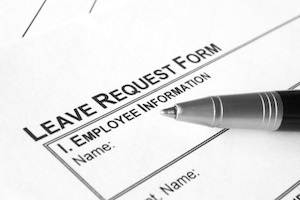
Leave of absence administration outsourcing can benefit employers. The labor and employment legal landscape have changed drastically over the past decade, and employers are encountering more compliance issues than ever. Beyond federal regulations, state and local rules are also changing, and it's more than some employers can manage on their own.
Laws regarding hiring, medical marijuana, wage deductions and paid sick leave are just a few that often stump employers. In fact, mandatory leave laws, in general, are some of the top reasons employers consider human resources leave of absence administration outsourcing services.
Leave laws come into play when an employee asks for medical, family, pregnancy-related, military or various other types of leave. The federal Family Medical Leave Act (FMLA), for example, applies to private employers with 50 or more employees and provides up to 12 weeks of unpaid leave during a 12-month period.
Leave of absence administration outsourcing can be a good solution, specifically regarding compliance, privacy, technology and reporting.
Managing FMLA leave continues to challenge employers. The lack of awareness or misunderstanding of regulations can lead to noncompliance, which can result in possible financial losses due to decreased productivity, fines by the U.S. Department of Labor (DOL), employee misuse and legal action.
By outsourcing FMLA administration, employers engage a neutral party to manage claims based on the most current rules and guidelines. This allows for fair and consistent treatment of leave across all employees and within all company locations.
FMLA claims are related to an employee's own health issues, outsourcing both disability and FMLA have been proven to help promote better absence management outcomes. Some of these outcomes consist of improved productivity, reducing lost time and direct costs.
Employees can utilize the FMLA to care for:
- A newborn
- An adopted or foster child
- A family member’s serious health condition (parent, son, daughter or spouse)
- The employee's own serious health condition
- A "qualifying exigency" that arises when the employee's spouse, child or parent is on active duty or has been called to active duty for the National Guard or Reserve in support of a contingency operation
The FMLA allows states to set standards that are more extensive than the federal law, which sometimes leads to employer confusion. Some states offer paid family and medical leave and others require paid sick leave. Additionally, some states require leave for things like:
- Voting and jury duty
- First responders
- Alcohol/drug rehabilitation
- Crime victims/domestic violence
- School activity
- Bone marrow/organ transplant
For more information on FMLA frequently asked questions regarding topics like eligibility, notice and certification, click here.
Knowing the law is one thing, but interpreting it is another — and that’s where HR outsourcing companies come into play. Small businesses, especially those without an HR department, may rely on outsourced HR professionals for direction regarding which leave laws apply to their business and what’s necessary to comply.
Here are some factors employers should consider:
- Which laws apply (usually based on company size)
- Which employees are covered and when they are eligible
- If there are any notice or posting requirements
- What the leave can be used for
- How much leave employees can take
- Whether the leave is paid or unpaid
- Whether or not it is job-protected leave
When an employee requests leave, employers should be sure to respond in a way that adheres to leave laws. It’s important to consider the intent of the laws to accommodate an employee’s needs and to explain the laws and your company policies.
Many labor and employment regulations are related. For example, even absent of any applicable leave laws, time away from work may be a reasonable accommodation under the Americans with Disabilities Act (ADA). The ADA is a civil rights law that prohibits discrimination against individuals with disabilities in all areas of public life, including jobs, schools, transportation and all public and private places open to the general public.
Title I of the ADA prohibits private employers, state and local governments, employment agencies and labor unions from discriminating against qualified individuals with disabilities in job application procedures, hiring, firing, advancement, compensation, job training, and other terms, conditions, and privileges of employment. The ADA covers employers with 15 or more employees, including state and local governments.
Outsourcing HR functions to a Professional Employer Organization (PEO) helps employers ensure compliance with federal and state employment and labor regulations. FrankCrum, a Florida-based PEO, has a team of HR consultants who offer FrankAdvice to business owners.
Beyond HR services, FrankCrum also offers
- Employee benefits with comprehensive benefits packages
- Benefits administration
- Payroll services
- Risk management services
- Workers’ compensation Insurance
If you’d like to learn more about how leave of absence administration outsourcing can benefit your company, contact FrankCrum – we’re always here to help.



.png)

